We visit Selma’s Voting Rights Museum on the Montgomery side of the bridge where in 1965, only five years before I began life in America, the police brutalized voting rights marchers. Coming upon the Klansman as I entered one of the rooms was startling but that was the only drama here. The museum’s thoughtful displays got me thinking more holistically about things I’d previously been distressed by only in isolation.
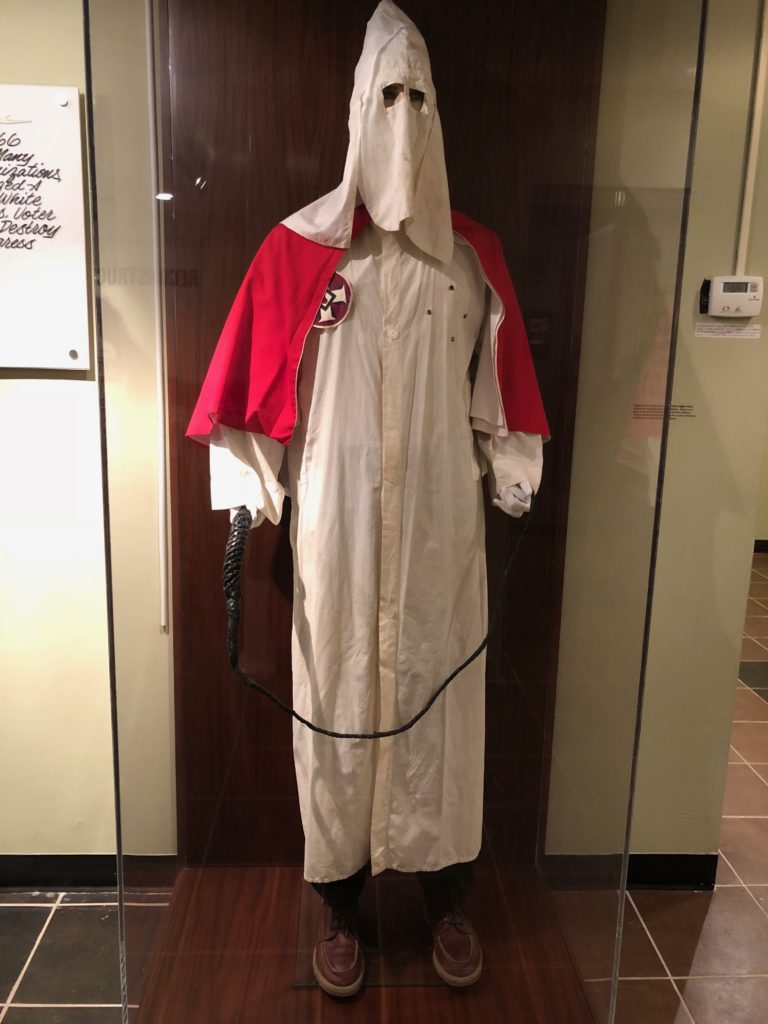
Our history is that of a white patriarchy built on genocide and slavery. There has been important legislative progress but the beliefs and behavior of our society’s first two centuries are still all too present. We must work skillfully for many more years to eradicate them entirely.
The Constitution, established in 1789, gave the responsibility for defining who could and could not vote to the States. Most of them enfranchised only the white male property owners who formed about 6% of the population.
Between 1792 and 1838 free black males lost the vote in several northern states. On the other hand, the abolition of property requirements gave more white males the vote between 1792 and 1856.
In 1868, following the Civil War, citizenship was granted to everyone born or naturalized here, which is the basis for future expansions of voting rights, and in 1870 non-white men including freed male slaves were granted the vote.
African Americans were, however, systematically disenfranchised by southern States and those actions were generally supported by the Supreme Court. Furthermore, while slaves were freed with, as Dr, King pointed out, no bootstraps by which to pull themselves out of poverty, white immigrants from Europe were given farmland for homesteads.
It was not just African Americans. In 1882 Chinese immigrants, many of whom were brought here to build the railroads, were denied citizenship. That was not repealed until 1943 by which time Japanese Americans had been incarcerated for a year. They were not released until 1946.
Native Americans were granted citizenship and therefore the technical right to vote in 1887 but only if they dissociated from their tribe. That requirement was not lifted until 1924. I’ve written before about the systematic extermination of Native Americans.
It was not until 1920 that women got the vote and they faced the same great practical obstacles to doing so as poor and non-white men.
It was only in 1965 that the Voting Rights Act gave every citizen the right to vote regardless of race, economic status, education, sex or any other characteristic.
But although “all men are created equal” is no longer just a nice phrase and its implications have been spelled out in the law, our behavior still must change. Here are some thought provoking recent remarks by Reverend Barber on white supremacy.
Our next stop is the Old Depot Museum where there’s an extraordinary range of exhibits including a dentist’s chair like the one where I developed my terror of dentistry. There’s also a replica of a seven inch rifled cannon. I had no idea there were such huge ones.
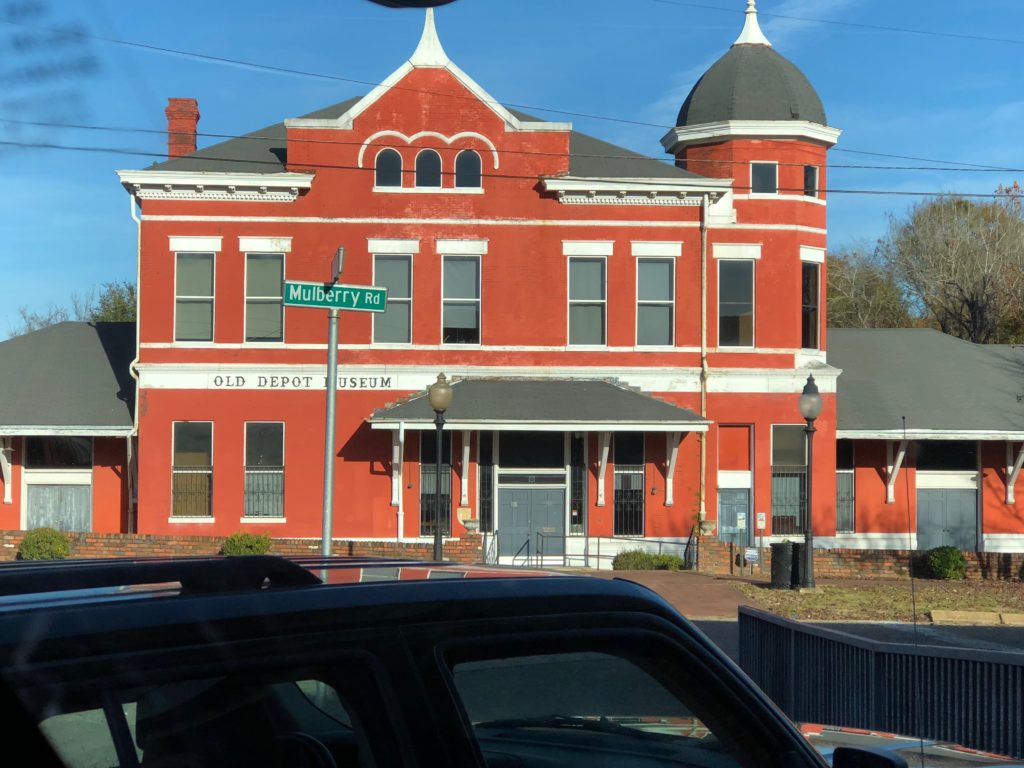
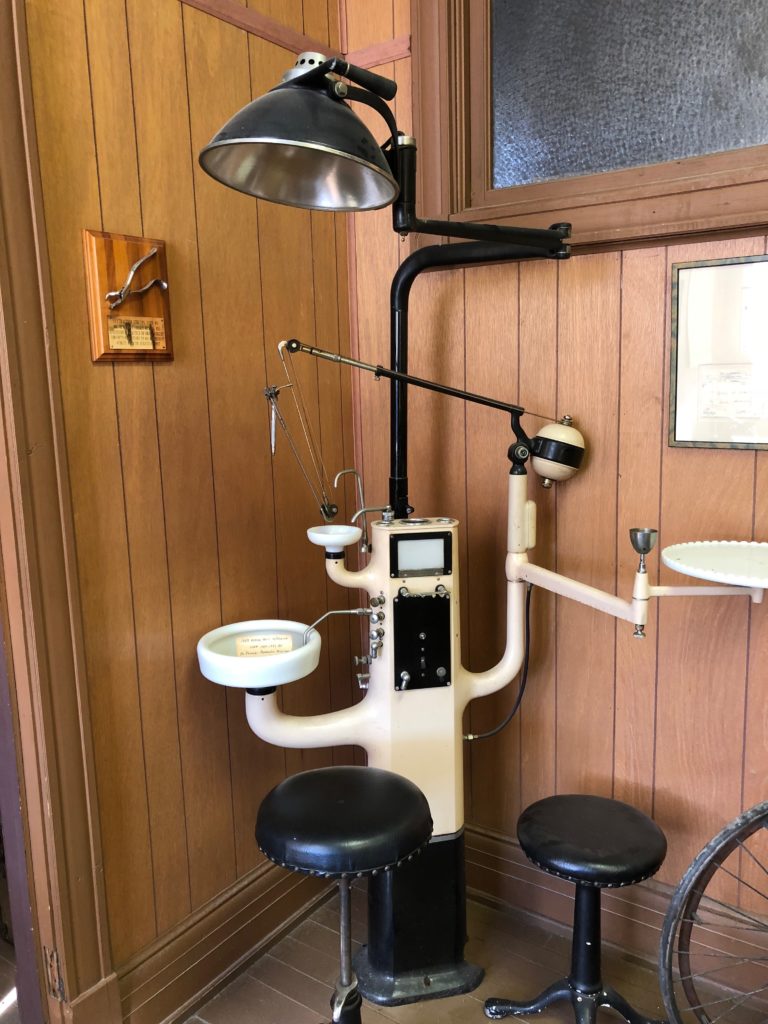
A set of 1872 rules for teachers lists their janitorial duties first. Then comes that male teachers may take one evening a week for courting purposes or two if they attend church regularly. Women teachers who marry or engage in unseemly conduct will be dismissed. After ten hours in the classroom teachers are free to spend the rest of their day reading the Bible.
As I enter a room in back of the second floor there’s a huge bible on a lectern and I remember the day I graduated from Richard Hale’s Free Grammar School for the Deserving Sons of Impecunious Gentlefolk Founded in 1608. I turn the pages to Ecclesiastes Chapter 12.
All 600 of us were marched to the church on that day every year for our final lessons, one of which, Ecclesiastes, was read by a senior boy. who, that year, was me. “Vanity of vanities, saith the preacher, all is vanity” seemed an odd final message. Presumably, the point was in verse 12, “of making many books there is no end; and much study is a weariness of the flesh“.
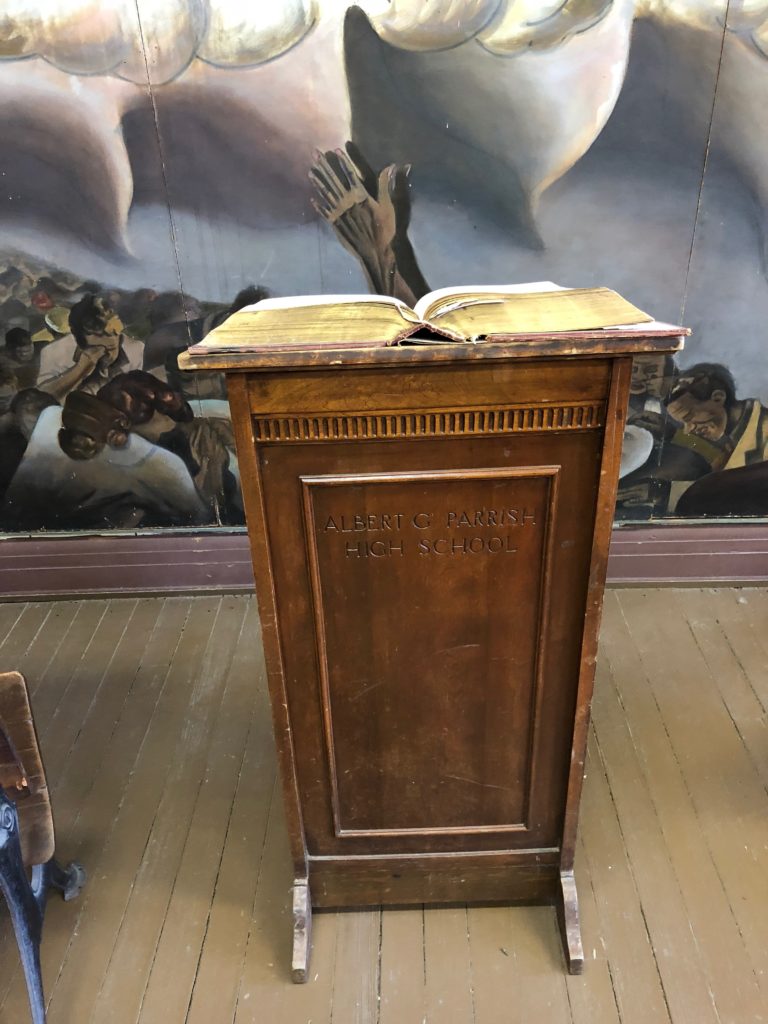
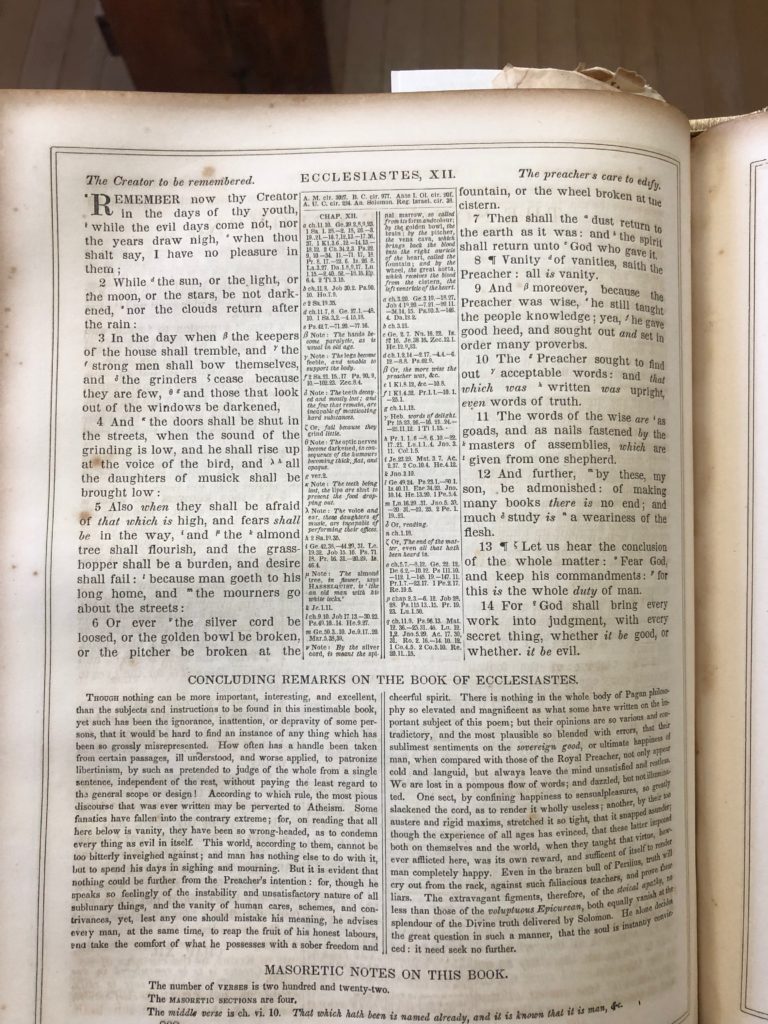
The highly animated lady who runs the museum says it’s impossible for anyone not to find something interesting here.
She tells us about her pet raccoon that she found behind the museum when it was tiny. She often brings it with her and it never chews the exhibits. It has great dignity and will not be chastised. It used to sleep at her feet. Now it curls up against her head, wraps itself in her hair and purrs.
We camp beside a lake at Prairie Creek State Park on the way to Montgomery. Felicity lights a campfire. We watch three great egrets perch silently on the opposite bank where they will spend the night.
Next day – A big flock of ducks flies in. They begin diving for fish and are soon joined by one of the egrets which dives, grabs a fish in its long beak without landing in the water and flies up to look for another one. Now cormorants come barreling along inches above the water.
I’m so lucky to have a good sense of humor. My fingers were cold at breakfast time when I was cutting open my capsules to put the powder down my tube but they worked well enough. I thought: “well, I may be dying but at least I’m not getting old”.
We drive to Montgomery and visit the First White House of the Confederacy where Jefferson Davis lived for a couple of months in early 1861 after being elected President of the Provisional Confederate Congress. The Confederate government moved to Richmond, Virginia that May.
We watch a fascinating DVD that gives what I’ve been hoping for, the origins of the Civil War from the southern point of view.
The historians on the DVD tell us eleven states seceded individually from the Union in 1860 and 1861 in protest against tariffs raised by the Federal government from 15% to 32% which not only hurt the southern states but favored the north. They then formed a Confederacy to protect themselves against potential northern aggression.
I do some research over the next couple of days. Tax was indeed a factor but the tariffs reflect a deep economic conflict at the root of which was slavery. The Northerners, notably the Quakers, objected to slavery on moral grounds but the greater issue was political power.
Secession seemed possible because Southerners read the Declaration of Independence statement “it is the Right of the People to alter or abolish it, and to institute new Government” to mean they could reject the Federal government and form a new one for themselves.
The rights of the states embodied in the Articles of Federation had been superseded by the Constitution. Many, particularly in the South, believed the original arrangement was better.
There was talk of “disunion” all the way up to when the Civil War began. There was a Nullification Crisis in 1832-33 when South Carolina declared Federal tariffs imposed in 1828 and 1832 were unconstitutional and unenforceable. That Crisis was ended by tweaking the tariffs but the underlying issue was not resolved.
A national tariff policy had been established after the war of 1812 to promote manufacturing. Tariffs were imposed on imports of manufactured goods to shield domestic producers from European competition.
Raw materials including cotton were not taxed, however. That meant the South faced overseas competition both for their exports and for purchases by Northern cotton mill owners. They also had to pay more for imported manufactured goods.
Because iron, coal and water power were mainly in the north and cotton entirely in the south, Southern politicians saw the tariffs as favoritism.
Tension between north and south increased in the late 1830s because many in the north thought the movements to annex Texas and make war on Mexico were fomented by slave owners wanting to dominate westward expansion.
Government in the South had in fact always been greatly influenced by wealthy slave owners and, as I’ll explain in a minute, Southern politicians whose wealth and power depended on slavery had disproportionate power in Congress.
That is the context in which the Civil War was about slavery. The Constitution did not prohibit slavery. The northern states had made it illegal while the southern states had not.
By the middle of the 19th century New England, the Northeast and the Midwest had a fast growing economy based on family farms, industry, mining, commerce and transportation, the area was rapidly urbanizing and it was attracting many European immigrants. Seven out of eight immigrants went to the north.
The South was dominated by plantations worked by slaves, it was chiefly rural and there was little manufacturing. Slave owners controlled politics and the economy.
The 1803 Louisiana Purchase had gained the US control of New Orleans, gateway to the nation’s river transportation system. It also made a vast new territory to the west available for expansion (where white immigrants were given land). It would be up to the States formed there to decide who did and did not get the vote.
Northern politicians and their sponsors were determined not to let the slave owners control that new territory. Plantation owners wanted it because cotton mono-culture exhausts the land so they wanted to keep moving west.
The Southern politicians and their sponsors were meanwhile concerned about the much faster population growth in the north, because that determined representation in the Electoral College. Political power was shifting to the north.
Southerners had been concerned about growing Northern power since 1820 when Missouri was almost denied admission as a slave state. Northerners on the other hand resented the extra seats gotten by the south because slaves were counted as 3/5 of a person.
Slaves were counted as a fraction of a person for tax purposes. They were viewed not as people but as property. The southern states didn’t want them counted as people in addition to taxable property although they did benefit from the additional representation they represented in the Electoral College.
In 1812, for example, the slave states had 76 out of 143 representatives but they would have had only 59 without the slaves. After the Civil War slaves were counted as whole persons, which further increased the South’s advantage, but they were systematically disenfranchised.
Southerners objected to the homestead laws that granted free farms in the west because small farmers would likely oppose plantation slavery.
Jefferson Davis believed the north and the south were so fundamentally different that they must be governed separately. He had no wish to attack the north. Lincoln, however, believed the nation must remain united and because that was paramount, whatever it took to restore unity must be done. The Confederacy must be stamped out.
So much detail to sort out (there is of course far more than I’ve cited above) and so many opinions. Understanding it is like my consulting projects years ago. It’s fun, but typing and copy editing are so much less easy on a phone.
Next day – This is different from my usual trip notes and more than long enough so I’ll be brief about today,
We drive to Cumming, Georgia to visit my cousin who I never met before and his family. We have a lovely time and accept their invitation to stay for a day or two.
We decide to head straight for home from here. We could do it in one long day by car but we’ll take it easy and give ourselves a couple or three days to complete the trip. We get Henry winterized because it’s well below freezing at night now. We’ll spend the night in hotels from here on.
So we did. Now it’s mid-December and our 100+ day, 10,000+ mile journey round part of the world is at an end. Here’s an appropriate anthem: We’re at the end of the line and “it’s alright riding around in the breeze, even though I’m old and gray I still have something to say — I’m happy to be alive.”

Martin,
In addition to its content, which is of special interest to me, your writing is easily read and flows so well. I’ve spent two periods of time in the south during the late 1950’s and early 1960’s. Memories of these times of foment in the U.S. we’re refreshed for me by your essay and new information unlocked too. I did not know that the exclusion of Chinese from citizenship continued until 1943. What stupidity we have encountered throughout out history.
Thank you,
Richard
Martin, what a treat to read your trip reports. It’s more than an inspiration, it’s so very moving and heart warming. How wonderful that you’re sharing this adventure!
Just to back up with Dick says – I love reading about your road trip which is inspirational.
Is there a map of your route somewhere? I’d like to see it.
Thanks,
Neil
Fabulous Martin. Inspirational. I enjoyed every minute of your trip. Thanks for doing this and keep up your excellent reporting.